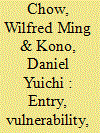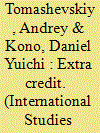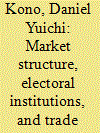|
|
|
Sort Order |
|
|
|
Items / Page
|
|
|
|
|
|
|
| Srl | Item |
| 1 |
ID:
157552


|
|
|
|
|
| Summary/Abstract |
Why are some autocracies more open to trade than others? And why are autocratic trade policies so volatile? Despite wide variation in how autocracies approach international trade, existing research offers few answers to these questions. We argue that the trade policies of autocratic regimes depend in part on the mode of entry of their leaders. Autocrats can enter power either legally—according to established rules of succession—or extralegally, through a palace revolt or coup. These different modes of entry lead to different posttransition politics and trade policies. Because new extralegal leaders are outsiders with limited resources, they are vulnerable to coups by other ruling elites. They reduce this vulnerability by building public support via lower tariffs. However, as they consolidate their rule, they reverse these initial tariff cuts. Extralegal entries thus lead to foreign economic policies that are more “cooperative” in the short run but more volatile in the long run.
|
|
|
|
|
|
|
|
|
|
|
|
|
|
|
|
| 2 |
ID:
139530


|
|
|
|
|
| Summary/Abstract |
Credit rating agencies such as Moody's and Standard & Poor's have considerable influence in the global economy. Nonetheless, we know little about the factors that affect these ratings, particularly factors under government control. We argue that participation in preferential trade arrangements (PTAs) can significantly improve national credit ratings by “locking in” liberal trade policies at home and abroad. This both ensures a stable stream of export revenues and represents a commitment to market-friendly policies of which the rating agencies approve. We test and find support for this hypothesis with an analysis of intra-PTA trade and credit ratings in 100 countries from 1971 to 2008. As expected, intra-PTA trade consistently improves national credit ratings. However, this effect is only partially mediated by trade volatility and other economic variables, suggesting that the rating agencies' support for PTAs is partly ideological in nature. Interestingly, overall trade openness does not affect credit ratings once we control for participation in PTAs. It is thus the formal commitment to open trade, rather than the volume of trade per se, that improves credit ratings. Our results point to the growing importance of private actors in international governance, as well as to the interrelated nature of trade and financial regimes.
|
|
|
|
|
|
|
|
|
|
|
|
|
|
|
|
| 3 |
ID:
092334


|
|
|
|
|
| Publication |
2009.
|
| Summary/Abstract |
The view that intra-industry trade is politically easier to liberalize than inter-industry trade is widely held and potentially explains key features of the global trading system. This view, however, rests on weak theoretical and empirical foundations. I argue that intra-industry trade can in fact lead to higher protection, but only where electoral institutions privilege narrow protectionist interests. I support this hypothesis with an analysis of trade barriers in 4,400 sectors in 65 countries and an analysis of lobbying in the US. My results imply that scholars should stop invoking intra-industry trade as an explanation for low trade barriers in wealthy countries and advanced manufacturing sectors. They also have important implications for the more general relationship between political institutions, collective action, and policy outcomes.
|
|
|
|
|
|
|
|
|
|
|
|
|
|
|
|
|
|
|
|
|